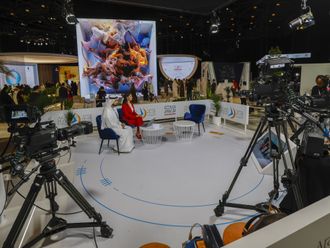Dubai: More than Dh205 million in unpaid salaries has been recovered by the General Department of Human Rights in the four years the Human Trafficking Monitor Centre has been running.
Dr Colonel Mohammad Al Murr, director of the General Department of Human Rights, said Dubai Police had recovered Dh205,159,693, with a round-the-clock complaint centre receiving 2,707 complaints in four years. Last year saw the highest number of complaints, with 748. All complaints were personal and the police established a team to deal with individual complaints, Dr. Al Murr said. The police had also received 273 collective complaints over the past four years, including 45 last year.
Dr Al Murr said the Human Rights Department had established a mechanism to contact workers to find out about their conditions and listen to their complaints, conducting 6,758 visits to labour accommodation complexes between 2009 and 2012.
Lieutenant Colonel Dr Sultan Al Jamal, director of the Centre for Monitoring Human Trafficking of the General Headquarters of Dubai Police, said that of the personal labour complaints received last year, 296 were about non-payment of salaries, which represented 41 per cent of personal complaints, followed by complaints of unfair treatment, cancellation of visas, bad treatment, visa transfers and salary deductions. The complainants were most likely to be Asian, comprising 81 per cent, with Arabs, Africans and Europeans also making complaints, in descending order of frequency.
Dr Sultan said that last year, the Human Rights Department conducted 1,768 inspection visits; 1,713 companies were found to be compliant with rules and regulations on the first visit, 15 were found after a further inspection to have complied with the regulations and the department was left to follow up with six companies.
A total of 27 companies were found to be in breach of the regulations and seven labour accommodation complexes were ordered to be evacuated as they were considered to be uninhabitable. He said that 97 per cent of companies in Dubai had abided by legal and healthy and safety standards in labour accommodations last year.
Dr Sultan noted that Lieutenant General Shaikh Saif Bin Zayed Al Nahyan, Deputy Prime Minister and Minister of Interior, had approved the methodology prepared by the Higher Committee for Labour Crises Management of the Dubai Police General Department of Human Rights.
He explained that this methodology emphasises the UAE’s keenness to support workers demanding their rights within the context of ensuring the rights of all parties and maintaining the national security in the best interest of all residents, including the workers themselves.
He referred to the policy of inspection which aims to monitor the living conditions of the contracted workers and to ensure that they are provided with appropriate housing according to the standards adopted by the competent authorities.
Dr Sultan said the total number of labour disputes from 2010 till the end of 2012 was 185, 87 of which were in 2010, 53 in 2011 and 45 in 2012.
Lieutenant General Dahi Khalfan Tamim, commander-in-chief of the Dubai Police and chairman of the Higher Committee For Labour Crises Management, stressed the importance of resolving labour issues promptly and in a civilised way to safeguard the interests of all parties, employees and employers alike.
He called for the promotion of a social security culture and for raising employers’ awareness on the importance of providing a decent life for workers and respecting their rights.
Major General Khamis Matar Al Mazeina, deputy chief of Dubai Police, said: “We want our experience in dealing with labor disputes to be a kind of behaviour and practice in our history, and not just a slogan. The Dubai Police has been a pioneer in addressing labour crises. We have launched a package of initiatives which have contributed directly to the reduction of labour protests.”












